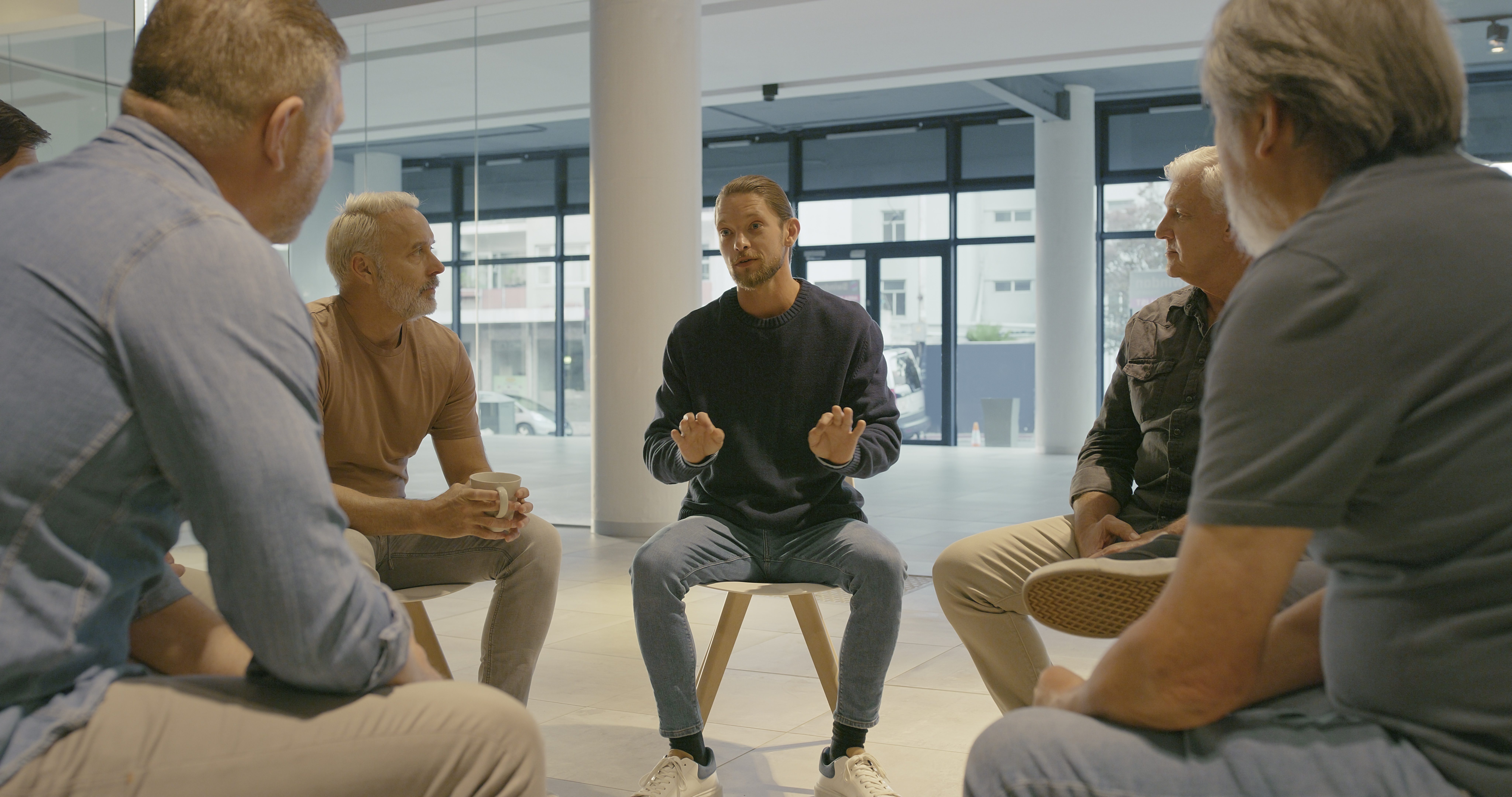what is group therapy?
Group therapy is beneficial for treating several different conditions. Learn more about group therapy and the resources available that can help.
Questions About Treatment?
Our knowledgeable team is ready to discuss your situation and options. Your call is confidential with no obligation required.
Understanding Group Therapy
Group therapy can be a beneficial part of a treatment program for those who struggle with mental health, addiction, or emotional distress. When deciding on a treatment program, it’s important to know what group therapy is to determine if it will be a good option for your personal needs.
What Is Group Therapy?
Group therapy involves one or two therapists leading a group of five or more people as they discuss their ongoing issues, work together to find solutions, and learn from one another. The most common form of group therapy treatment is done through talk therapy, also known as group psychotherapy. 1
How Does Group Therapy Work?
The purpose of group therapy is to provide a sense of community and allow group members to work together towards a common goal of recovery. Supportive group therapy sessions provide group members with an outlet where they can discuss issues openly with one another.
Is It Effective?
According to the American Psychological Association, studies have shown that group therapy is as effective as individual therapy for most conditions. Approximately 75% of people who partake in individual psychotherapy sessions will see benefits, so the same effectiveness rate could be said for group therapy. 2

Different Types of Group Therapy
Different types of group therapy may be used. Depending on the condition someone is struggling with, different forms of group counseling can be more effective than others.
Cognitive Behavioral Groups
Cognitive behavioral therapy (CBT) is a treatment that operates on the concept that changing negative thought patterns will help reduce poor behavioral patterns.
CBT group counseling can help group members work together to share their problems and recognize negative thought patterns that are occurring. CBT group therapists will help group members learn coping skills and ways they can create more positive thoughts during stressful situations.
Interpersonal Process Groups
Interpersonal group therapy is an unstructured form of therapy with no formal agenda, and the leader does not begin the session with a question. Interpersonal process group counseling is focused on relationship building and helping group members develop better interpersonal skills.3
Psychoeducational Groups
Psychoeducational group counseling typically focuses on treating substance abuse. Psychoeducational groups are designed to help educate clients about substance abuse and related behaviors and consequences. 4
Skills Development Groups
Skills development groups are designed to help clients who struggle with behavioral or social issues. These groups help develop life skills and interpersonal skills that lead to better overall functioning in daily activities.
Support Groups
Support groups are a gathering of people who are struggling with similar issues. During support group sessions, group members will share, listen, and provide positive support to one another.
Techniques Used in Group Therapy
Many different group therapy techniques may be used during therapy sessions. Common group therapy techniques are: 5
- Expressive: Explore difficult experiences and express emotions connected to those events.
- Goal setting: Help group members set goals and create a plan to accomplish them.
- Gratitude: Group members share about different areas of their life they are thankful for.
- Icebreaker: Use icebreaker activities that help group members get to know each other.
- Sharing: Group members ask questions and share their thoughts on various topics.
Benefits of Group Therapy
Group therapy has many benefits, making it a good treatment option for many different conditions. Some of the benefits of group therapy will be detailed below.
Provide a Safe Space
Group therapy provides a safe and supportive environment for group members to share their thoughts and feelings. Group members are asked to support one another and work together towards a common goal.
Offer a Sounding Board
Group counseling provides a sounding board for those who are going through difficult times. Group members are allowed to freely express their emotions and ideas to one another to get struggles out in the open in a healthy way.
Give Confidence
Group meetings help provide confidence to group members as they learn and grow together. Over time, group members will feel a sense of accomplishment as they see improvements in their personal lives.
Helps in Self-Discovery
Exploring thoughts, feelings, and emotions during group treatment sessions will help self-discovery while working through difficult issues. This can provide insights that individuals would not have learned on their own.
Confidentiality
Group meetings are confidential providing group members with a sense of confidence that they can freely share whatever is on their minds. Confidentiality creates a judgment-free zone where everyone is welcome to participate.

Conditions Group Therapy Can Help With
While mental health group therapy is often the most common, there are many different conditions that group therapy can treat. Common conditions that group therapy can help with include:
- Attention-deficit/hyperactivity disorder (ADHD)
- Depression
- Chronic pain
- Anxiety
- Panic disorder
- Chronic illness
- Phobias
- Post-traumatic stress disorder (PTSD)
- Substance use disorder
- Anger management
What to Expect from Group Therapy Sessions
Before attending a group therapy session, you may wonder what to expect. During your first group therapy session, the therapist will help introduce you to the group and set forth the guidelines and rules of the group. Icebreaker activities are commonly used to help open group members since it can be difficult to share immediately when new to the group.
The therapist will also likely provide questions for group members to answer and opportunities for each member to share their struggles. Group members may then support one another or give insights into their thoughts on specific topics. Group sessions are designed to be welcoming, and members are encouraged to be kind to one another.
How to Get Started With Group Therapy
One of the best ways to look into getting started with group therapy is to do an online search for group therapy options in your area. You can then research different options and try to decide what is the right fit.
Another good option for those struggling with more severe mental health, addiction, or behavioral issues is contacting a treatment center offering group therapy. Receiving group therapy from a treatment center provides a well-rounded treatment program that leads to high rates of success.
Resources
- https://www.apa.org/topics/psychotherapy/group-therapy
- https://www.apa.org/monitor/2019/04/group-therapy
- https://www.uidaho.edu/-/media/UIdaho-Responsive/Files/current-students/counseling-testing-center/counseling/10-ways-to-get-the-most-out-of-group.pdf?la=en&hash=D5A831C9D7807B9570920AF2E2CD0D0877D8745B
- https://www.ncbi.nlm.nih.gov/books/NBK64214/
- https://www.verywellmind.com/what-is-group-therapy-2795760#toc-group-therapy-techniques
Questions About Treatment?
Our knowledgeable team is ready to discuss your situation and options. Your call is confidential with no obligation required.

